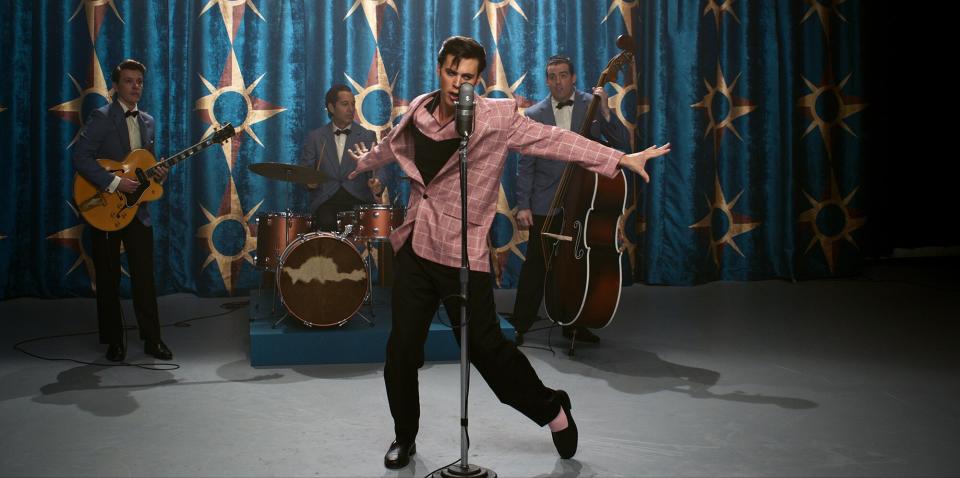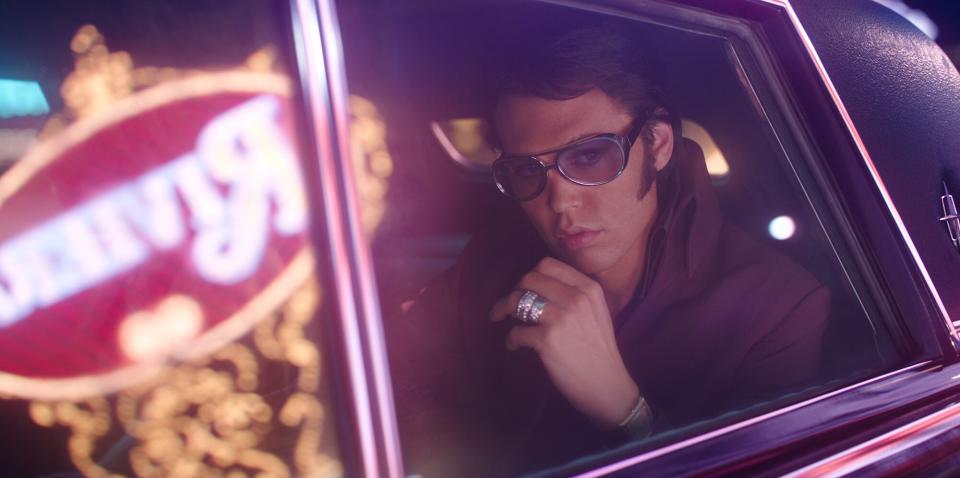Fact or fiction: 5 scenes from Elvis and the real-life stories behind them
- Oops!Something went wrong.Please try again later.
A liberated and expressive filmmaker, Baz Luhrmann won't be constrained by a just-the-facts approach — especially when his subject, Elvis Presley, lends itself to showmanship. Elvis is loaded with so many unbelievable moments that we kept a list as we were watching. Consider us surprised to discover that most of them were true: the strangest turns of an outsized life.
Did Elvis really sing to a dog on television?
Though Elvis Presley singing to a basset hound in a top hat seems too ridiculous to be true, it actually happened. After a provocative hip-swiveling performance on The Milton Berle Show, Presley was instructed not to move when appearing on The Steve Allen Show where the host introduced him as the "new Elvis," just as Colonel Parker dubs him in the film. Presley gamely tries to sing "Hound Dog" to the pup on a pedestal, and he really did return to Memphis afterwards and announce at his next concert: "You know, those people in New York are not gonna change me none — I'm gonna show you what the real Elvis is like tonight."
Did Elvis really nearly get arrested for his style of performing?

Warner Bros. Pictures Austin Butler in Baz Luhrmann's 'Elvis.'
While it's true that Presley's blatantly sexual performance style stoked prurient panic, earned him the absurd nickname "Elvis the Pelvis", and caused him to be flagged to the FBI as a potential security threat, a concert in Elvis condenses several instances in Presley's career. Among the moments combined into one scene are a Jacksonville, FL, concert where he wiggled his pinky in mockery of a judge's order to tone down his moves, and a 1957 Los Angeles concert where the vice squad filmed him to ensure he wasn't gyrating too much. Presley was arrested twice in life (once for speeding), but never for his supposedly "dangerous" thrusting.
Did Elvis really mistake an overzealous fan for an assassination attempt?
Elvis showcases Presley's gradual drug-fueled descent into paranoia (fed by the Colonel's determination to keep Elvis on U.S. soil on the grounds of security), and it's exemplified in a moment where he almost shoots a fan rushing the stage. Presley did receive death threats, and performed with a loaded Derringer in his boot and a .45 pistol in his waistband at a 1970 concert where the FBI believed a credible threat had been made. In a separate incident in 1973, Presley ejected four men who rushed the stage at a midnight show. They were merely intense fans, but Presley became obsessed with the idea that Mike Stone, a karate instructor who'd had an affair with Priscilla, had sent the men to kill him.
Did Elvis really shoot a television?

Warner Bros. Pictures
The incident is rooted in pop culture and, amazingly, it's true — actually he shot several of them. There's a 25-inch RCA TV at Graceland where you can still see a bullet hole (he was watching friend Robert Goulet perform). Elvis apparently had a fetish for guns, and, per one bio, took old TVs out to the "graveyard" behind his house for target practice. A motel in Asheville, NC, is said to be the site where Presley, renting a pair of conjoined rooms in 1975, took aim at another television. Nobody knows exactly why.
Did Elvis really have a doctor on staff to keep him supplied with drugs?
He only rates a call or two in the film, but George Nichopoulos — known as "Dr. Nick" — was Presley's full-time personal physician and the man who, in many ways, hastened the King's downfall by irresponsibly prescribing him addictive narcotics and tranquilizers for years. In 1970, after treating Elvis sporadically for a few years, Nichopoulos was brought on formally to supply the King and his entourage with everything from sleeping pills to painkillers. He's not a major element in Luhrmann's movie, though Dr. Nick does represent a distinctly American dark side of healthcare, and his presence fits within the director's larger cultural thesis.
Related content:
The man who would be King: Inside Austin Butler's Elvis transformation
The Elvis cast and director Baz Luhrmann on how they brought the King back to life
Tom Hanks goes dark: Why our favorite good guy wanted to play the Elvis villain
How actor Austin Butler mastered the distinct sound of Elvis Presley's voice

